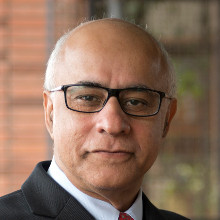[Photograph by Horia Varlan under Creative Commons]
Under what circumstances does one decide to walk away from business that is on offer?
I was 28, an eager, first-time entrepreneur. The company I had co-founded was in the business of training and consulting for corporations that were about to introduce small business computers for the first time. We trained the top and the middle management on how to use computers and along the way, we also helped our clients in change management. This invariably required us to work with an internal change agent and often such people are folks in a hurry.
In one particular case, the change agent, in addition to shepherding the IT initiative, was also in charge of diversification. In the course of our interactions, he somehow felt that we understood corporate strategy and not just IT; he asked us to help put together a presentation for his London office with a tight deadline.
For us, it was a flattering idea—we felt this was our great opportunity to break into the McKinsey league.
The truth is, we had no idea what it was all about. We had enthusiasm but no competence.
The first time we showed our output to the gentleman, he was taken aback, he took it upon himself; probably he hadn’t briefed us well. He didn't want to discourage us. He suggested changes and we went back to the drawing board.
Meanwhile, his deadline was ticking. We attempted the exercise a second time and went back—our engagement style and output were progressively looking like school boy homework seeking teacher-approval. We weren't a consultant producing useful work.
This time, the man frowned, realizing his folly of misreading our capability. We retreated, folded up the effort and of course, we didn't charge anything but that was of little consolation. The customer's stress was huge.
Through it all, I learnt a very important lesson: say "No" when you don't know something.
Now that sounds contradictory to the idea of emergence, of taking risks, trying stuff out and diversification. Be that as it may, the thing not to do ever, is to say yes to work for which one has no competence, where the customer's reputation rests on it, and there is a deadline. That combination requires a retreat and not bravery.
Unlike my misadventure into McKinsey land, what happens when you do have the capability, the customer needs you but, know what? The customer is abusive with you. Worse still, he is nasty with your people.
In every entrepreneurial journey, you do come across someone who has the buying power but is utterly disrespectful. One of the tenets of entrepreneurship that I wrote about in my first book, The High Performance Entrepreneur, is egoless behaviour. Entrepreneurs don't put their personal ego in the path of business. After all, customers can have an attitude—our job is to ignore their quirks and look at the cash-flow and the profitability, right? Wrong. Egoless mindset is not equal to servility. I am here to serve but not be servile.
Early in my life, a customer once asked me how I decide who to do business with? It set me thinking. I thought about it all night. The next morning, I told him four things: my choice of customers is guided by professional value-add, a sense of equality, trust and a commercially win-win proposition. If these are missing, it is better that I serve someone else and the customer chooses another partner.
In these four things, professional value-add is all about me, the supplier, benefiting from the relationship through learning from my customer. If it is just money, it is a lost opportunity. When we work with customers whose association makes us grow professionally, our innate value for future transactions goes up.
Next comes the idea of equality. This one excludes doing business with folks who require us to give up self-respect. The real test of equality is the customer’s ability to take 'no' for an answer. Some customers don't like that; they think a supplier is a slave. By going along with them, eventually, I do disservice to them because when the customer is doing something that is actually not good for her and at the same time won’t take no for an answer from me, she is on a self-destructive path and I am an accomplice.
The third test is trust. Sometimes, intuitively, you know a relationship won't ever be built on trust. You see it in the very second meeting. If that be the case, the business on the table is peppered with future pain.
The fourth consideration, and in that exact same order, is the idea of whether the deal will create a commercially win-win situation. If it does not, there better be a good reason for me to pick it up. Else, it is worth staying hungry for the day, to go another place and knock at another door.
[If you have any questions mail us as askbagchi@foundingfuel.com]

